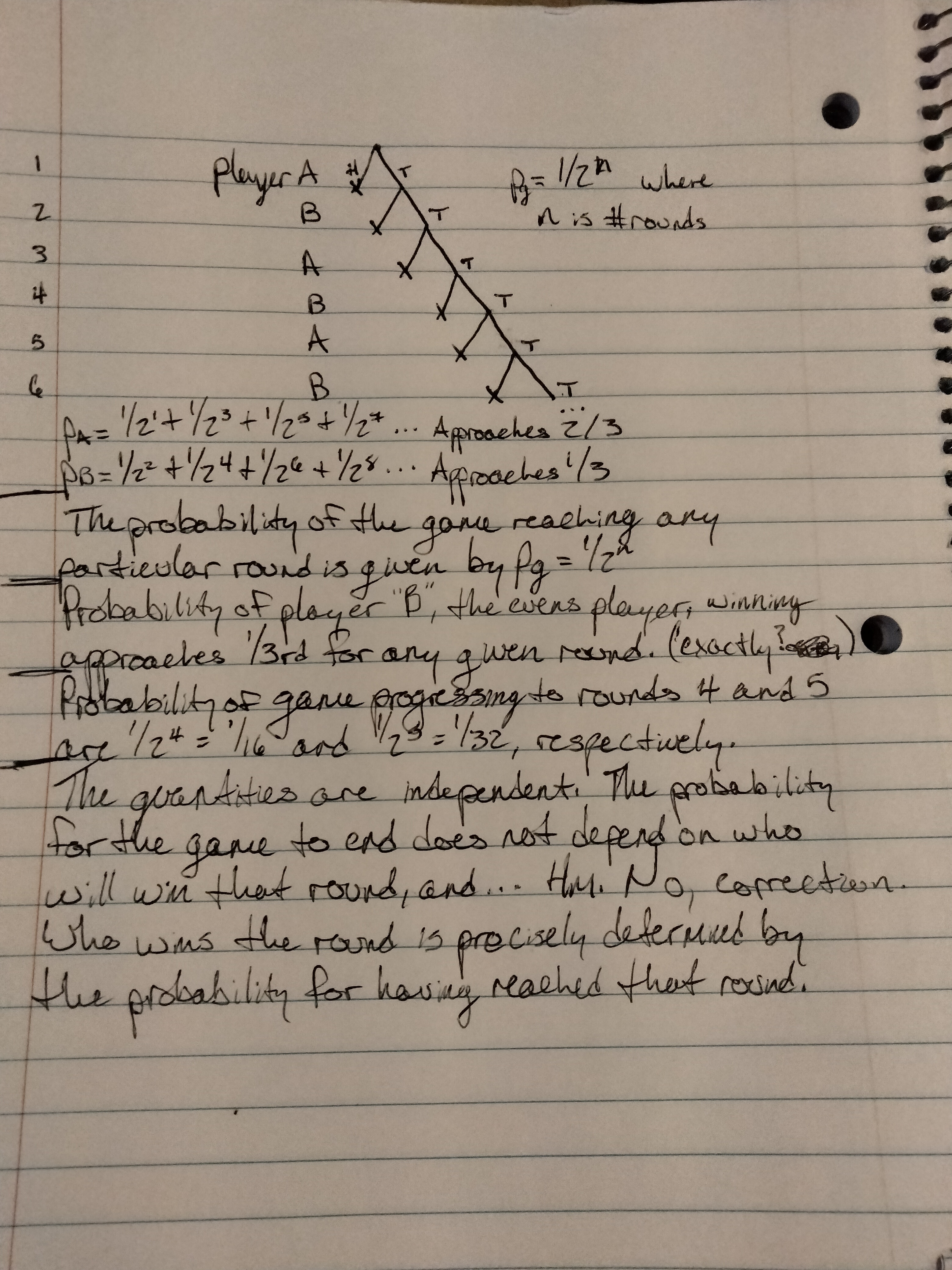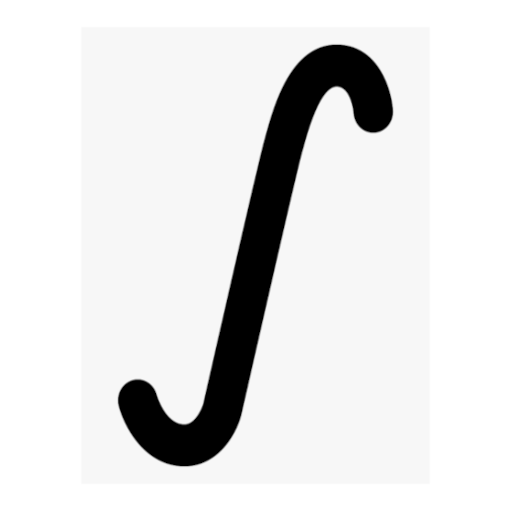We’re playing a game. I flip a coin. If it lands on Tails, I flip it again. If it lands on Heads, the game ends.
You win if the game ends on an even turn, and lose otherwise.
Define the following events:
A: You win the game
B: The game goes on for at least 4 turns
C: The game goes on for at least 5 turns
What are P(A), P(B), and P(C)? Are A and B independent? How about A and C?
Are all games played to completion? Assuming yes,
answer
P(A) = Sum[1/4^n,{n,1,∞}] = 0.333... P(B) = 1/8 P(C) = 1/16One of A,B or A,C is dependent, as it’d flip the polarity of the remaining games, the other is independent, as it wouldn’t. I’m not too worried about which is which, as it’s just an off-by-one error. xD
Assuming no, You’d have to know the distribution of when games were abandoned, I’d think.
Games are always played to completion, though if you wanna make it (barely) more challenging you can add in a 5% chance for both players to get bored and give up on each round (before flipping), leading to a loss. Though it seems unlikely - after flipping a quarter 20 times and getting Tails every time, I’d be inclined to keep flipping if anything.
response
These are correct. It is possible to reason out which of B and C is independent of A without going into the numbers.
after flipping a quarter 20 times and getting Tails every time, I’d be inclined to keep flipping if anything.
It’s a sunk cost fallacy, it’s never too late to get bored and give up. ;)
A supertask.

Now, I dunno nuffin’ 'bout no Statistics Theory, but I was able to graph this as a branching tree in a way that made sense to me and brought myself to what I thought was a satisfying conclusion.
Typed Response
The probability of the game reaching any particular round is given by PG=1/2n where n is the number of rounds.
Probability of player “B,” or the evens player, winning approaches 1/3 by PB=1/22 + 1/24 + 1/26 + 1/28 …
I determined the variables were dependent: Who wins the round is precisely dependent on the probability for having reached that round. Arguably this is correlation and not strict dependence, however.response
This is close, but you’ve got an off-by-one error where you calculate the probability of making it to the nth round as 1/2^n. Consider that that would imply you have a probability of 1/2 for the game to make it to round 1, or 1/4 to make it to round 2, etc - it should be 1/2^(n-1). Correcting this would give you the correct answers for P(B) and P(C).
As for the dependence question, I’m not sure I followed your arguments there - but saying both are dependent is not correct.
im not sure i understand either. could you tell me what dependence and independence mean in this context? perhaps that is the source of my confusion. i understood it in a naive sense of one variable depending on the other for its outcome, and that whether the evens player wins is simply dependent on the number of the round. B therefore A and C therefore not A seem like tautological and equivalent dependencies(?) if i understand the question, and there is a good chance i do not. Ah, but i reread “at least” now, which changes everything.
Yes, i’m quite certain now: I do not understand.
also, how come i got the right probability for the players’ winrate if my calculation of that was based on one over two to the n instead of the n minus one? Why didnt the off by one error carry forward giving the odds player the 1/3 chance and vice versa?
like i said, dont know nuffin.
In probability, two events are said to be independent if one event happening has no effect on the probability of another event happening. So coin flips, as an example, are independent - because when you flip a coin and get Tails, that doesn’t affect the probability of the next coin flip also coming up Tails.
So in this context, asking if A and B are independent is asking: Does knowing the game lasts at least four turns change the probability of winning? And similarly for A and C. Does knowing the game lasts at least 5 turns change the probability that the game will end in a victory?
Rest of response
To be clear about your other answers, saying P(B) = 1/16 and P(C) = 1/32 are not correct - I was saying if you adjusted your formula, from 1/2^n to 1/2^(n-1), then your answers would be correct. So the probability of the game lasting at least four turns is 1/2^(4-1) = 1/2^3 = 1/8, and the probability of it lasting at least 5 turns is 1/2^(5-1) = 1/2^4 = 1/16.
But I think you were more asking about why this didn’t affect your win rate - that’s because there’s a subtle difference between “making it to the nth round” and “having the game end on the nth round” - and that difference is that once you make it to a round, you then have a 1/2 probability to end the game - which makes the probability of ending on the nth round the 1/2^n you used.
I read the other answers in the thread, and I definitely would have gotten this wrong without that. This answer stands a chance at least
Independence
A and C are independent, A and B are not. Since you have a chance to win on turn 4 that you do not have on turn 1, P(A|B) = 1/2 + 1/16 + 1/64… = 7/12 != P(A). Conversely, P(A|C) = 1/4 + 1/16 + 1/64… = 1/3 = P(A)
response
This is the correct answer, although P(A|B) should actually be 2/3 rather than 7/12 - I think you meant 1/2 + 1/8 + 1/32 + …?
The reasoning is good, either way. Since past flips won’t affect future flips, if the player has made it to turn 5, an odd turn, then their future prospects are no different than they were on turn 1, another odd turn - so A and C are independent. Similarly, A and B are dependent because your chances of winning and losing effectively flip: If you’ve made it to an even turn, then you now win if it takes an odd number of flips from there to get Heads.
So it should be an almost paradoxical-seeming situation: You win 1/3 games overall, you win 2/3 games that make it to turn 2, you win 1/3 games that make it to turn 3, you win 2/3 games that make it to turn 4, 1/3 that make it to turn 5, etc.
response
Thanks for the catch! Once I noticed that the probability of winning on the initial flip was the difference between the two, I stopped thinking about the other terms…
solution
Say Omega = N\{0}, sigma algebra is power set of N and the probability mass function is p(n)=2^-n .
Then A is all the even numbers, B all numbers at least 4, C all numbers at least 5.
P(A)=sum2-n = sum2-2n = sum4-n = 1/(1-1/4)-1=1/3
P(B) = P(N\{1,2,3}) = 1 - 1/2 - 1/4 - 1/8 = 1/8
P© = 1/16 similarly
P(A and B) = P(A\{2}) = 1/3 - 1/4 = 1/12 =/= P(A)P(B) therefore not independent
P(A and C) = P(A\{2,4}) = P(A)P© with a similar calculation and therefore independent
deleted by creator


